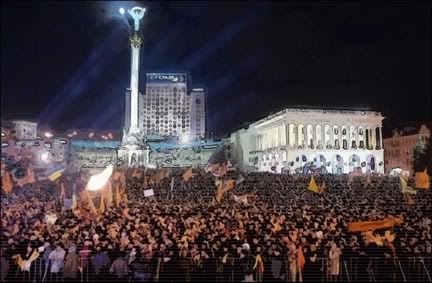Adam Larson/Caustic Logic
Guerillas Without Guns/Chapter 7
Posted 5/9/07
Russia’s response to the assault on its European periphery states in 2003-2004 demonstrates two unique and related historical patterns. The first is Russia’s split personality, straddling the arguably imaginary line that separates Europe from Asia. Russian thinkers have tackled the issue of Asian vs. European identity for centuries. Peter the great tried to settle this in 1703 by founding St. Petersburg and tying Russia into Europe’s affairs, but during the Great Game with England over Central Asia in the 1800s again European vs. Eastern/Asian/other became the paradigm. Since the Bolsheviks moved the capitol back to Moscow, and more so since the collapse of the USSR, Russia's European aspirations have been lessened in favor of a centralizing view that looks south and east as well as west.
The other key factor is Russia’s tactic of withdrawal when threatened, as they did when Napoleon invaded. Moscow was abandoned and burnt to the ground, leaving nothing for the French army, most of whom died in the attempt to get back home ahead of winter. When things get rough on the European front, Russians pull back to the east, relying on the continental vastness of their Eurasian territory to wait out the crisis.
2004-05 was such a time, and indeed Russia’s power focus has to a remarkable degree shifted east as ambitions in Europe slid into political obscurity. It’s not so much that the Kremlin has abandoned its plans for Europe as that it is diversifying its holdings and making contingency plans for an uncertain future there. So Putin’s Moscow started taking greater interest in increasing control over its former Central Asian holdings; the independent but cooperative nations of Kazakhstan, Uzbekistan, Kyrgyzstan, Tajikistan, and to a much lesser extent ‘neutral” Turkmenistan.
The Central Asian Republics seemed relatively safe from the Orange Revolution type of tactic. In Europe there is the EU, NATO, and a long history of Democratic institutions and mindsets. But these landlocked Muslim-dominated nations, resource-rich but impoverished and still run largely on Soviet habits and older memories, lie in an area still jointly dominated by “great power rivals” Russia and China. Central Asia is a long way from Brussels – and so as the democratic bridgehead struggled to cross the last spans of Europe, this was the Bulkhead of Russia’s Eurasian power outside its own borders.
The area also represents the heart of “the Grand Chessboard” of Eurasia as portrayed by Zbigniew Brzezinski. He describes this region as the “Eurasian Balkans,” encompassing the Caucasian and Central Asian flanks of the former USSR plus Iran and Afghanistan. Compared to the European Balkans, “the Eurasian Balkans are infinitely more important as a potential economic prize,” at twenty times the size and presenting an enormous zone of instability “astride the inevitably emerging transportation network meant to link [Eurasia’s] western and eastern extremities.” [1] Thus as in times ancient, the region was to be the crossroads of Eurasia, host to a 21st Century Silk Road as Unocal called it – pipelines, fiber optic cable, superhighways, all facilitating further globalization of a previously under-tapped region.
There was more than transport at stake though; Central Asia straddles the Himalayan foothills, producing a tectonic cornucopia of mineral wealth, including tin, gold, and platinum in large quantities. And to a world increasingly thirsty for oil and natural gas, Central Asia has stood out for one key reason – the energy reserves of the Caspian Sea; Fortunes and political careers were made and broken in what Ahmed Rashid in 1997 dubbed “the New Great Game.” After 9/11 we found that the prize was not as big as originally thought, (and hence the war was not about that). But by mid-2006, world oil prices climbed from a pre-9/11 baseline of about $25 a barrel to well over $70 a barrel, US News and World Report noted in their September 11 2006 issue “the stakes have suddenly shot up,” and interest is now as intense as ever. [2]
---
Next: From Shanghai with Love: The Shanghai Cooperation Organization
Sources:
[1] Brzezinski. "The Grand Chessboard." 1997. Page 124.
[2] Fang, Bay. “The Great Energy Game.” US News and World Report. Vol 141, no. 9. September 11 2006. p 60-62.
Saturday, May 26, 2007
THE NEW GREAT GAME
Labels:
Brzezinski Z,
Caspian pipelines,
Central Asia,
Great Game,
opium,
SCO,
Tajikistan,
Taliban,
terrorism
Subscribe to:
Post Comments (Atom)


No comments:
Post a Comment